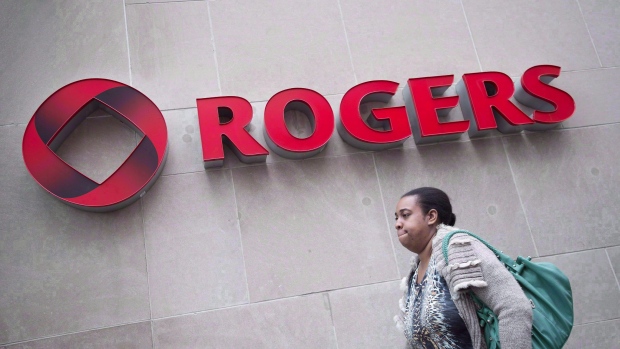Jan 25, 2018
Rogers edges past profit expectations in fourth quarter
The Canadian Press

TORONTO -- Rogers Communications Inc. reported a fourth-quarter profit of $419 million, ahead of estimates, but the lack of an expected dividend hike Thursday caused analysts to grill its CEO about the company's spending priorities.
Chief executive Joe Natale said the quarter capped a strong 2017, with growth largely driven by its best wireless financial results since 2009 and the best subscriber metrics since 2010.
"Turning to 2018, we have strong momentum, a clear plan for sustained financial growth, along with strategic capital investments in our core business."
He said the company's dividend -- 48 cents per share quarterly, the same as it has been since early 2015 -- will be increased when the time is right but didn't indicate when that would happen.
Analysts on his conference call quickly focused on the lack of a dividend increase and a five-day Rogers promotion in three provinces in mid-December that sparked a price war and widespread consumer complaints about long waiting times.
"Clearly, execution for us was a challenge," Natale responded.
He said Rogers experienced a technical problem with its price-adjustment system -- limiting its ability to sign up customers and resulting in some prospective customers turning to its competitors.
"We believe that period of time cost us about 35,000 (net additions to its wireless subscriber base), to put a very specific, definitive number on it," Natale said.
"I do believe it's an isolated incident . . . but we've found the root cause, corrected it and it's been isolated and behind us."
He was asked if the December promotion -- which Telus and Bell eventually matched -- was sparked by a very similar deal introduced a few weeks earlier by Shaw's Freedom Mobile, and if Rogers lack of a dividend increase means the company is worried about future profit margins.
"The promotional activity in Q4 had nothing to do with any one of our competitors . . . full stop," Natale said.
He added that the impact from Freedom "is very small. At the margin. Non-material. Not of consequence overall. . . . . And there's absolutely zero concern from the board, from management, about that impact, whatsoever."
Natale said the company's decision to put money into capital spending and debt reduction -- rather than a dividend increase -- is because of its belief that the No. 1 priority is to invest in its core business for the long term.
"We will return to dividend growth at the right time," he said.
He added that the company's key priorities at this time would be investments in upgrading its wireless networks to fifth-generation technology, bidding on spectrum licences at a government auction, and rolling out the next generation of home TV and internet technology on a neighbourhood-by-neighbourhood basis.
The company said its Q4 profit amounted to 81 cents per share for the period ended Dec. 31.
That compared with a loss of $9 million or two cents per share a year ago when it was hit by a large, one-time charge after it shut down video-streaming service Shomi, which was conceived as the company's next generation of TV content delivery.
Since then, Rogers has adopted a next-generation TV distribution system pioneered by Comcast, one of the biggest cable companies in the United States.
On an adjusted basis, Rogers said it earned $455 million or 88 cents per share in its latest quarter compared with an adjusted profit of $382 million or 74 cents per share a year ago.
Revenue totalled $3.63 billion, up from $3.51 billion, boosted by improved wireless revenue due to subscriber growth and a greater number of customers on higher-rate plans.
Analysts on average had expected $3.64 billion in revenue for the quarter and an adjusted profit of 86 cents per share, according to Thomson Reuters.




